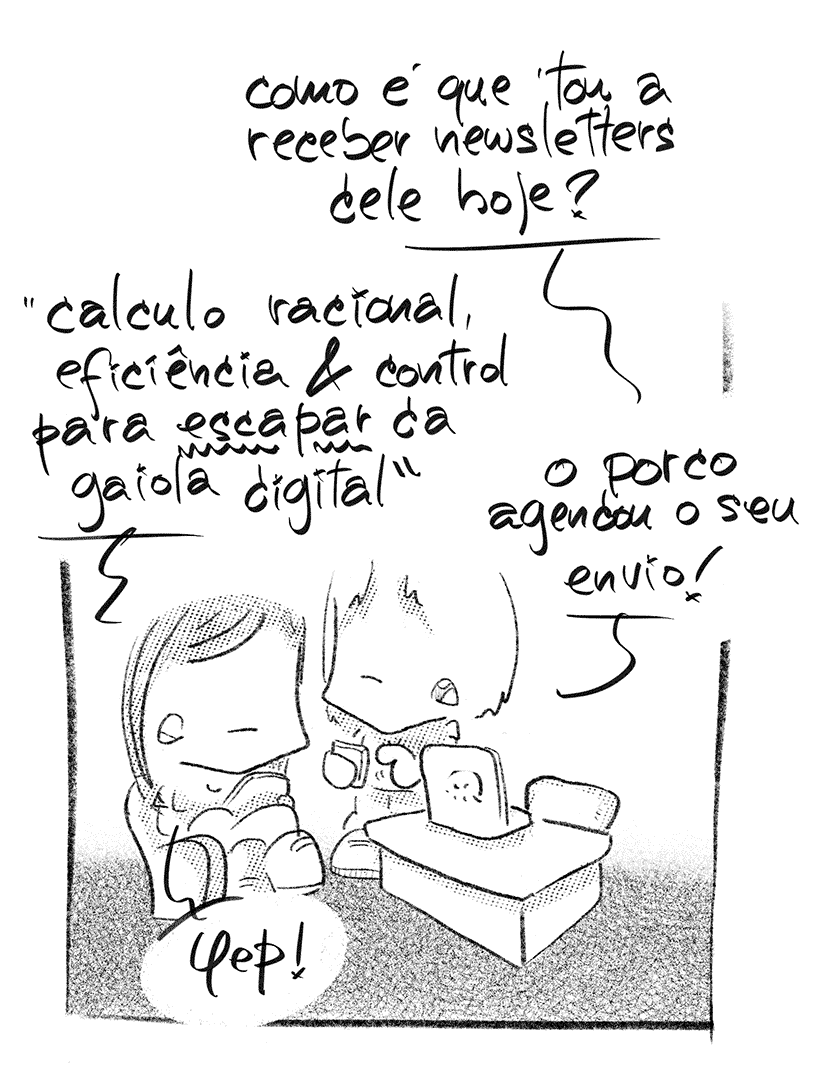digital cage

Update ao termo, os avozinhos conheceram-no como "iron cage", gaiola onde os indivíduos seriam confinados a "systems based purely on teleological efficiency, rational calculation and control" on tha rise nesta era moderna Wikipedia: abr 2019. Anyho, tecnologia! 'bout time...: connect, plug in, power on, start up, press play, whatever: vamos à razão instrumental mas lembrando que podemos sempre pôr essa merda de lado quando já farta, e aqui terminamos do recap em ética da autenticidade por terceiros. Big caps para teaser:
De onde vieram e o que podemos acrescentar a debate:
To a large extent, instrumental reason compels our assent through setting up coercive systems and institutions, such as the "invisible hand" of the marketplace, and yet, there nonetheless remains some reserve of critical reason that is not exhausted by external compulsions. We are not, in other words, in an "iron cage." This reserve of critical reason is important to avoid political defeatism. If we really think minds are at the mercy of institutions, our outlook will be bleak. If, however, we believe that atomised individuals are capable of collaborating about common concerns, then we begin to form a common political orientation.
in "The Ethics of Authenticity (Chapters 6-10)" 4 jul 2015
Nota: Taylor não toma partido no debate da razão instrumental acusando ou defendendo a tecnologia mas deixa um comentário em dualidades esquerda / direita:
"Crudely put, the knockers of authenticity are frequently on the right, those of technology on the left". And yet, Right-wingers tend to advocate maintaining tradition even as their enthusiastic support for unfettered capitalist economic policies has proved highly corrosive to traditional ways of life. Nor is this contradiction only on the right; many lefties hold "an attentive, reverential stance to nature,"" and yet "some adversaries of savage capitalism carry possessive individualism farther than its most untroubled defenders".
in "The Ethics of Authenticity (Chapters 6-10)" 4 jul 2015
Exposto o tema, a lógica através de um processo que admitimos pouco linear. Por partes:
Coming to grips with the compelling force within the ideal of instrumental reason is the first step to recovering a sense of purpose in instrumental reason.
in "The Ethics of Authenticity (Chapters 6-10)" 4 jul 2015
Dessa força convincente:
Instrumental reason has grown up in an era of thinking about the subject that downplays reason’s messy entanglements in bodies, social relationships, emotions, and traditions. We find such disconnected use of reason in the mathematization of social policy, for example.
in "The Ethics of Authenticity (Chapters 6-10)" 4 jul 2015
Um loop negativo que parece reforçado justamente pela mesmo movimento que o devia contrariar: self-determining freedom.
We are free when we can remake the conditions of our own existence, when we can dominate things that dominate us. Obviously this ideal helps to lend even greater importance to technological control over our world; it helps to enframe instrumental reason in a project of domination, rather than serving to limit it in the name of other ends.
in "The Ethics of Authenticity (Chapters 6-10)" 4 jul 2015
Para quebrar esse ciclo:
Despite the powerful compulsions that instrumental reason has, we can resist domination by recalling two of the moral contexts from which instrumental reason arose.
in "The Ethics of Authenticity (Chapters 6-10)" 4 jul 2015
- 1. Instrumental reason is grounded in a moral ideal “of a self-responsible, self-controlling reasoning.
- 2. Instrumental reason is connected to the “affirmation of ordinary life” — reason should be put to the service of perpetuating life and family (rather than being purely unengaged thought for the sake of thought).
...quen os devolve ao presente:
So instrumental reason is animated by moral ideals, not only by blind self-propagating force. Retrieving the moral background helps us to consider the ends to which instrumental reason should be put:
in "The Ethics of Authenticity (Chapters 6-10)" 4 jul 2015
- 1. what are the conditions of human life needed to realize the ideals in question?
- 2. what would effective realization look like?
OS POSITIVOS: a descobri-lo na teoria e prática.


